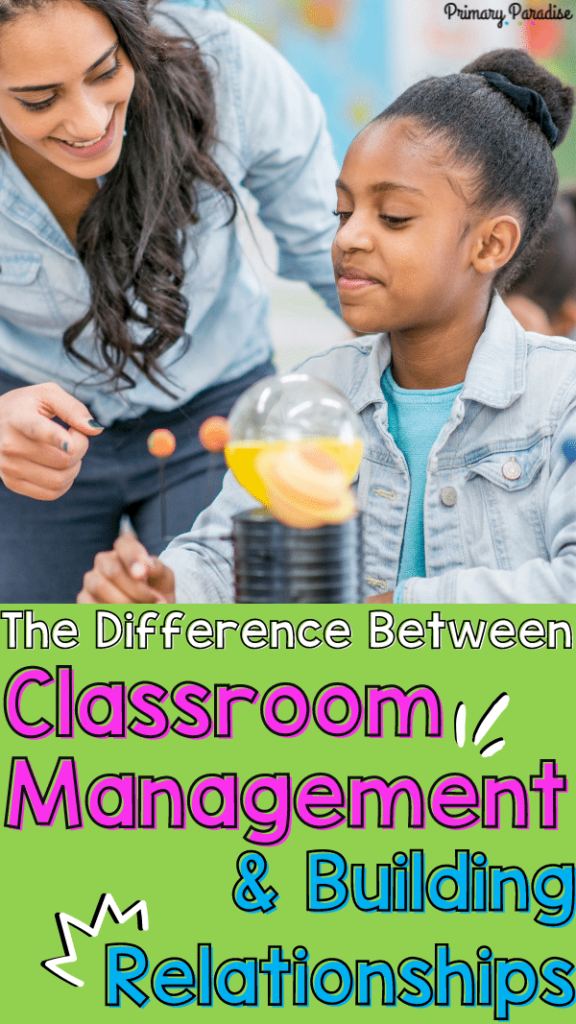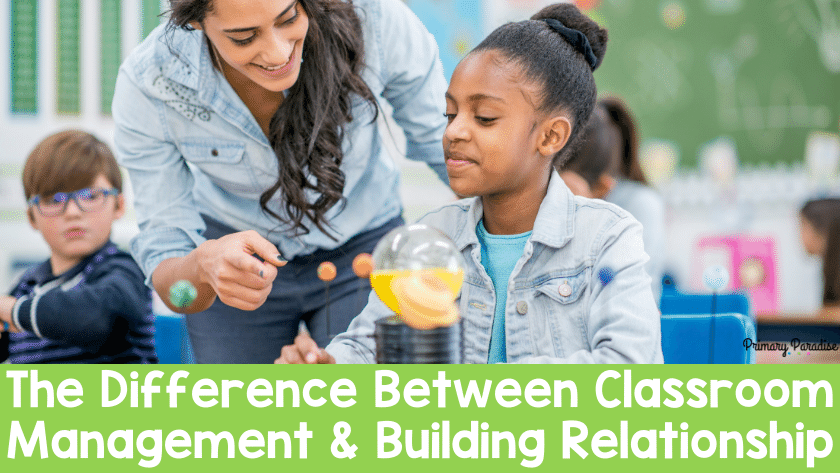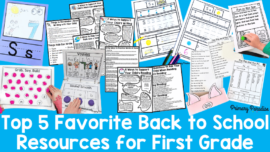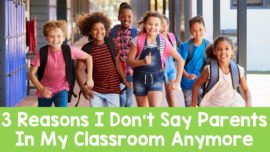Classroom management is an important part of being a teacher. Building relationships with your students is also incredibly important. However, these are not the same things. Let’s explore what the differences between classroom management and relationship building are. We will also talk about how they work together.
How are Classroom Management and Relationship Building Different?
In recent years in the education space, there has been a huge emphasis on the importance of building relationship with students. While this is 100% important, there also seems to be a lack of focus on classroom management as well. You can see my take on how to do this here. Building relationships with students helps make classroom management easier for a number of reasons. However, building relationships alone is not a classroom management strategy. Let’s delve deeper.
What exactly does building relationships with students do?
In a nutshell, building relationships with students is essentially working to build trust with students. It is giving students the opportunity to trust you and vice versa. There are a number of ways you can do this in a real and authentic way. It comes down to understanding who each of your students are. Teachers who have built a relationship with their students know and understand their students as individuals. They know what motivates them, what scares them, what stresses them out, what makes them laugh, and when to give and take responsibility.
A strong relationship gives your students a feeling of safety and comfort in your classroom that allows them to be themselves. It helps them be opened to learning. A strong relationship gives the teacher knowledge of your students that you can use to help them through their learning journey. This includes academic, social, emotional, and physical tasks. Of course, we build relationships because it is beneficial and lovely. But, it also gives us a toolkit to use when our students are struggling in some way. The deeper and more authentic the relationship, the more tools we have to pull out to support them.
What exactly is classroom management?
You might be thinking, cool! But, what’s the difference between that and classroom management? While relationship gives us the knowledge of what tools to pull out of our toolbox, classroom management is the actual tools. Things like proximity, wait time, controlled ignoring, taking a brain break, routines, procedures, setting expectations, developing consequences for actions, conflict resolution, and scaffolding learning are parts of classroom management.
These are just a few of the many strategies teachers use to manage the learning and behavior in their classroom. There are one-on-one management tools, small group management tools, whole group management tools, learning management tools, emotional management tools, and behavioral management tools.
It includes how you set up your classroom and organize supplies, how you handle things like morning routine, class jobs, and how you run your centers. Classroom management includes how you speak, where you gather your students, and the responsibilities you give your students.
How are relationship and classroom management connected?
The problem with focusing solely on relationship is that it’s only half of the puzzle. If we focus only on one or the other, we, and our students, will struggle. Here’s an example. Let’s think of learning in our classroom as building a birdhouse. If we know and understand the steps to build a birdhouse (relationship), but don’t have a hammer, nails, or wood, we aren’t going to successfully build a birdhouse. On the flip side, if we have a decked out toolbox and some beautiful pieces of wood (classroom management) but don’t actually know how to build a birdhouse, we still aren’t going to be successful.
In the classroom, it works the same way. If we have great relationships with our students, but no bank of tools, we won’t handle difficult situations very well. If a student is distracted and not working on their work, you might try a strategy that has the opposite effect than you want.
If you have a whole bunch of classroom management tools, but you don’t know your student well, the same thing might happen. Maybe you choose proximity, but that student needs a verbal instruction. Maybe you ask them what’s up loudly and they’re immediately embarrassed and shut down.
However, if you know your students and have a bank of classroom management tools, you can handle the situation in the right way. If student A is off task, you know they just need you to stand close to them and they’ll get right back on task. If student B is off task, you know they aren’t easily embarrassed, so saying their name and miming writing will do the trick.
How can I get better at managing my classroom?
If you want to know how to build relationships, you can read this blog post. If you want to grow in your classroom management skills, there are a two big things you can do.
- Observe other teachers-Great classroom management skills require experience. The best way to learn is by observing other teachers. Seeing what they do that works and doesn’t work can be extremely helpful. You’ll then need to try some of the strategies they used and see what works and feels comfortable for you. The thing with classroom management is that we all have our own style, and you have to see what works well for you.
- Educate yourself– Another great way to learn classroom management skills is to take time to read books and blog posts with ideas. It’s important to read critically though and analyze whether the techniques they’re sharing are actually beneficial for students. If you’re looking for some blog posts, here are a few of mine.
- letting go of control in your classroom
- building expectations together
- how to set up your classroom with students and budget in mind
- helping students resolve conflict
- creating a calm down area
- independent student tasks
Although classroom management and relationships work together, they are two separate and important areas to focus on as a teacher.




